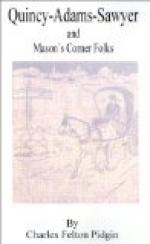He next rode to his father’s office on Court Street. The Hon. Nathaniel had just lunched at Parker’s and was enjoying a good cigar when his son came in.
Quincy told him that the Jim Sawyer at Eastborough Poorhouse was unquestionably their missing relative.
“Poor Jim,” said Nathaniel; “I ought to go and see him.”
“No; I wouldn’t,” said Quincy, “it will do no good, and his remorse is deep enough now without adding to it.”
He then told his father about the money, and the latter agreed that Jim’s idea was right and Quincy had best use the money as though it were his own.
“By the by,” said his father, wheeling round in his office chair, “that Miss Putnam from Eastborough is a very pretty girl; don’t you think so, Quincy?”
“Handsome is as handsome does,” thought Quincy to himself, but he only said, “Where did you see her?”
“She was in here to-day,” replied his father. “She said she had $25,000 to invest, and that you gave her the address of some broker, but that she had forgotten it.”
“Her statement is partially true,” said Quincy, “but not complete. I gave her three addresses, because I did not wish to recommend any particular one. I wished her to make her own choice.”
“I was not so conservative,” remarked his father. “I advised her to go to Foss & Follansbee and even suggested that Quinnebaug Copper Company was one of the most promising investments before the public to-day.”
“Did she confide in you any farther,” said Quincy.
“Oh, yes,” replied his father; “I gleaned she was worth $100,000 and that her parents, who were very old people, had nearly as much more. I remember her brother, J. Jones Putnam. He was a ‘plunger,’ and a successful one. He died suddenly of lung fever, I believe.”
Quincy smiled.
“She seemed to be well educated,” his father continued, “and told me that you and she sang together at a concert.”
“Did she tell you what her father’s religion was?” inquired Quincy.
“You don’t seem to admire this young lady, Quincy. I thought she would be likely to be a great friend of yours. You might do worse than—”
“I know,” said Quincy, “she is pretty, well educated, musical, very tasteful in dress, and has money, but she can’t have me. But how did it end?” asked he; “how did you get rid of her?”
“Well,” replied his father, “as I said before, I thought she must be a great friend of yours, and perhaps more, so I went down to Foss & Follansbee’s with her; then we went to Parker’s to lunch, then I sent her to the station in a coupe.”
“I am greatly obliged to you, father,” said Quincy, “for the kind attentions you paid her. I shall get the full credit of them down in Eastborough; your name will not be mentioned; only,” said Quincy with a laugh, “if she is coming to the city very often I think perhaps I had better come back to Boston and look after mother’s interests.”




